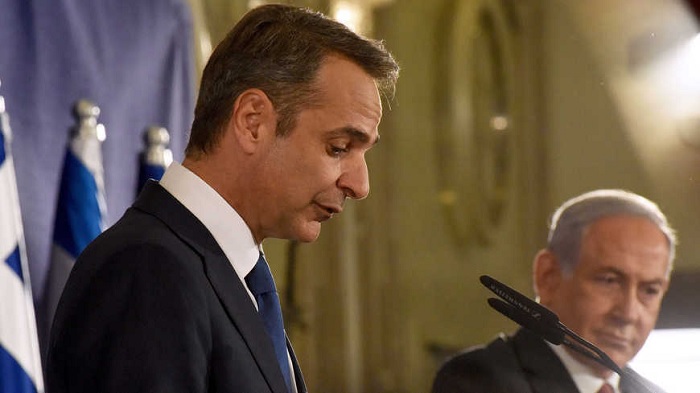
Israeli, Greek and Cypriot foreign ministers met today in Athens, showcasing again the strong strategic alignment between the three countries.
Foreign Minister Gabi Ashkenazi met this afternoon in Greece with his Greek and Cypriot counterparts, Nikos Denidas and Nikos Christodoulides. The trilateral meeting was dedicated to issues of energy, security and diplomatic developments, showcasing the strong strategic alliance between these three countries.
“I am very happy to be here today, to continue the tradition of the trilateral meetings between Greece, Cyprus and Israel. Ever since I took office as Israel’s foreign minister, I considered these meetings extremely important,” said Ashkenazi after the meeting, adding, “The partnership between us contributes to keeping the stability and advancing prosperity and security for the entire region.” Ashkenazi said that agreements with the United Arab Emirates, Bahrain and Sudan have created a new circle of strategic, commercial and tourism cooperation, and called upon the Palestinian leadership to seize the moment and realize the magnitude of this opportunity for peace. He emphasized that he is a great believer in the power of the trilateral diplomacy to strengthen the security of all three countries. “I intend to personally advance this partnership in connecting infrastructure in the fields of strategy, technology, electricity and more,” he stated.
Prime Minister Benjamin Netanyahu has spent the past few years nurturing and developing Israel’s partnership with Greece and with Cyprus, counterbalancing deteriorating ties with Turkey. In fact, the worse ties became between Jerusalem and Ankara, the stronger grew the alliance with Athens and Nicosia.
Last June, Greek Prime Minister Kyriakos Mitsotakis was the first foreign leader to arrive in Israel since the coronavirus pandemic began. Mitsotakis arrived in the country heading a large official delegation including five ministers. The two governments held their fourth Government-to-Government (G2G) forum in Jerusalem.
Then in August, Denidas visited Israel again, in a mutual effort to relaunch tourism. The coronavirus had hit Greek tourism hard and after a first lockdown, Israelis were desperate for touristic destinations. The mutual opening of skies and borders was in everyone’s interest. Israel announced the opening of its skies three days after Denidas’ visit.
The trilateral alliance has a significant strategic component, which was evident in the meetings Ashkenazi held on Oct. 26, before the trilateral summit on Oct. 27. Upon arrival, the Israeli minister met with both Greece’s prime minister and its foreign minister, tweeting later, “We discussed the positive changes in the Middle East, including the recent peace agreements and those countries joining the process. We also discussed the tensions in the East Med and its impact on our countries.” Later, Ashkenazi met with Greek Defense Minister Nikos Panagiotopoulos.
“We discussed security issues including the tensions in the East Med, the Iranian threat and the need to outlaw Hezbollah. We also discussed opportunities for security cooperation and mutual assistance in times of emergency,” he tweeted.
Between his meetings with the Greeks and Cypriots, Ashkenazi also met Russian Foreign Minister Sergey Lavrov. Ashkenazi updated Lavrov on developments in the normalization deals with the United Arab Emirates, Bahrain and Sudan as well as the Iranian threat, Iranian entrenchment in Syria and the issue of Hezbollah. He was later quoted as saying, “Israel appreciates the ties and the coordination with the Russian government on preventing an Iranian entrenchment in Syria.”
 Eurasia Press & News
Eurasia Press & News

